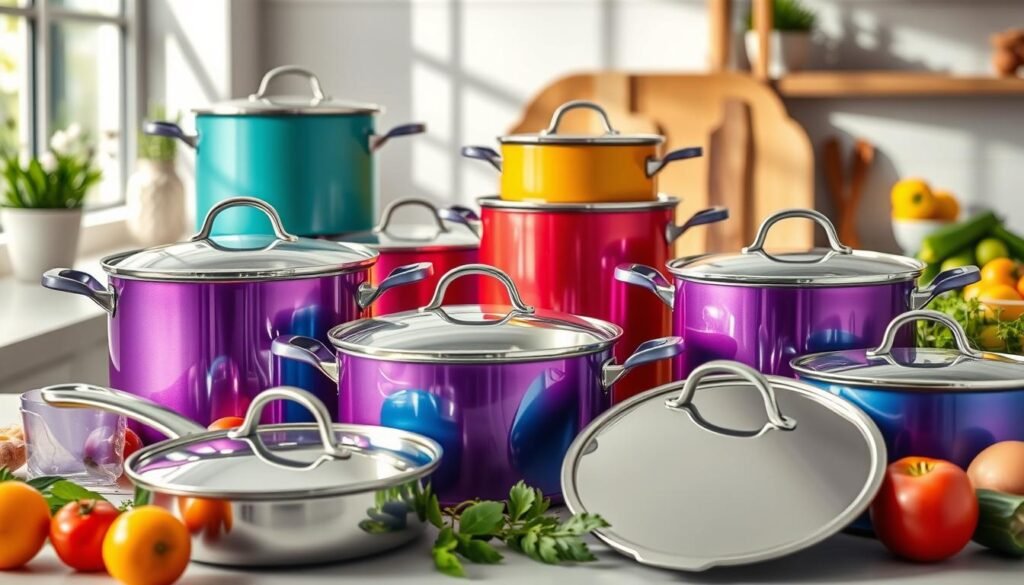Do you grab your aluminum pans without thinking? Diecast aluminum cookware is common in kitchens, but safety worries exist. Is it safe, or is it a health risk? Explore this guide to find out about diecast aluminum cookware’s safety and how to use it right.
Key Takeaways
- Diecast aluminum cookware is made through a high-pressure casting process, resulting in stronger, more durable pans.
- Diecast aluminum offers excellent heat distribution and retention, making it a popular choice for various cooking tasks.
- Concerns about aluminum leaching into food have been largely debunked, with minimal risks for most individuals.
- Proper care and maintenance, such as avoiding highly acidic foods and using non-abrasive cleaning methods, can help ensure the safety of diecast aluminum cookware.
- Anodized aluminum cookware provides an additional protective layer to further reduce the risk of aluminum leaching.
Understanding Diecast Aluminum Cookware Basics
Diecast aluminum cookware is loved by both home cooks and professional chefs. It’s known for its great properties and many uses in the kitchen. This cookware is made by pressing molten aluminum into molds. This method makes pans with thick bottoms, which hold heat well and cook food evenly.
The Manufacturing Process of Diecast Aluminum
The making of diecast aluminum cookware starts with heating aluminum to the right temperature. Then, it’s quickly pushed into a mold under high pressure. This process fills the mold’s details, giving the cookware a smooth finish. The molds are made of strong tool steel, ready for the high heat and pressure.
Properties and Characteristics
Diecast aluminum is tough, doesn’t scratch easily, and can handle high temperatures. It’s perfect for many kitchen items like pans and baking sheets. It conducts heat well and is light, making cooking easy. It’s also treated to be non-stick and resistant to corrosion, making it even better for cooking.
Common Uses in Kitchen Cookware
Diecast aluminum is used for many kitchen items because of its great qualities. It’s great for making pans, pots, and baking sheets. Its shape and thickness help with even heat, perfect for searing, sautéing, and baking.
“The aluminum die casting market size was $50.5 billion in 2019, and the compound annual growth rate (CAGR) of the aluminum casting market is expected to be 6.4% from 2020 to 2027.”
Is Diecast Aluminum Safe: Health and Safety Considerations
The safety of aluminum cookware has been debated, especially about aluminum leaching into food. Studies show aluminum can leach, especially with acidic dishes. But, the amount absorbed by the body is usually small compared to other food sources.
The World Health Organization has set a safe weekly intake for aluminum. Using and caring for aluminum cookware properly can reduce risks. This means avoiding acidic foods in uncoated pans and replacing damaged cookware.
Anodized aluminum and non-stick coatings help prevent aluminum leaching. This makes them safer for aluminum toxicity and toxic metal exposure worries. Following guidelines for using and maintaining aluminum cookware can also improve food safety with aluminum and aluminum leaching.
| Statistic | Value |
|---|---|
| Aluminum ingested daily by Canadians | 10 milligrams, mostly from food |
| Aluminum from pots and pans | 1-2 milligrams of the total daily intake |
| Link between aluminum and Alzheimer’s disease | No clear link found in studies |
While there are concerns about aluminum toxicity and toxic metal exposure from cookware, health authorities say the risks are low. Proper use and care of cookware can make it safe. By understanding the safety aspects and following best practices, you can use aluminum cookware safely.
In conclusion, diecast aluminum cookware can be safe and useful in your kitchen if used and maintained right. Being aware of food safety with aluminum and aluminum leaching can help minimize risks. This way, you can enjoy the benefits of this versatile material.
Benefits and Advantages of Diecast Aluminum Cookware

Diecast aluminum cookware is a great choice for home kitchens. It heats up quickly and evenly. This is thanks to its unique casting process.
Superior Heat Distribution Properties
This cookware heats food consistently. Whether you’re searing, sautéing, or baking, you get the same results. It’s also energy-efficient, saving you time and money.
Durability and Longevity Features
Diecast aluminum is very durable and doesn’t warp easily. It’s built to last, making it a smart kitchen investment. Plus, many products come with non-stick coatings for easy cleaning.
Cost-Effectiveness Compared to Other Materials
Diecast aluminum is cheaper than copper or stainless steel but cooks just as well. It’s also light, making it easy to handle big pots and pans. This makes it a budget-friendly choice for upgrading your kitchen.
Diecast aluminum cookware is a reliable and versatile choice for home chefs. With the right care, it will last for many years, offering consistent and efficient cooking.
Conclusion
Diecast aluminum cookware is a great mix of performance, durability, and cost. Some worry about aluminum safety, but using it right can lower risks. Anodized aluminum and non-stick coatings add extra safety features.
Choosing the right cookware means thinking about your cooking, how you maintain it, and your health. There are other options like stainless steel, cast iron, and ceramic. Each has its own good and bad points. By making smart choices and following safety tips, you can enjoy aluminum cookware safely.
Finding the right cookware is about balancing performance, safety, and what you like. Knowing about diecast aluminum and looking at other options helps you make safe choices. This way, you can improve your cooking without worrying about your health.
FAQ
Is diecast aluminum safe for cooking?
How is diecast aluminum made?
What are the advantages of diecast aluminum cookware?
What are the potential health concerns with aluminum cookware?
How can I safely use diecast aluminum cookware?
Source Links
- Die Cast vs. Non-Stick Cookware: Navigating the Culinary Landscape – https://macclite.com/blogs/health-life-macclite/die-cast-vs-non-stick-cookware-navigating-the-culinary-landscape?srsltid=AfmBOooYZkkv8j1mIRStxr5m0iv7glc1VSsAKlAVKLwbzevrp5NTHFwz
- Are Aluminum Pans Safe? Here’s What You Need To Know – https://homeandtexture.com/are-aluminum-pans-safe/
- Aluminum Die Casting: A Comprehensive Guide on Die-Cast Aluminum Process – https://www.rapiddirect.com/blog/aluminum-die-casting/
- Aluminum Die Cast Ohio – Protocast Inc. – https://protcast.com/aluminum-die-cast-ohio-525104/
- Are aluminum pans safe? Separating facts from fiction – https://www.greenhive.io/blog/are-aluminum-pans-safe-separating-facts-from-fiction
- Is Die Cast Aluminum Safe? – Bian Diecast – https://mag-cast.com/is-die-cast-aluminum-safe/
- The Advantages of Using Cast Aluminum | The Federal Group USA – https://www.tfgusa.com/cast-aluminum-advantages/
- Die Cast vs. Non-Stick Cookware: Navigating the Culinary Landscape – https://macclite.com/blogs/health-life-macclite/die-cast-vs-non-stick-cookware-navigating-the-culinary-landscape?srsltid=AfmBOoqnzYDCVwfpuxW7RdXlFoUOI4k4C7EdOQ-iyLNJsXw8Cq5s-Zyc
- Die Cast Cookware Safety, Benefits & Die Cast Cookware vs Cast Iron Cookware – https://www.diecasting-mould.com/news/die-cast-cookware-safety-benefits-die-cast-cookware-vs-cast-iron-cookware
- IS DIE-CAST ALUMINIUM SAFE? – Die casting manufacturer in China, die casting ,aluminum die casting – https://castingod.com/is-die-cast-aluminium-safe/
- Is Die-Cast Aluminum Cookware Safe? – Sonex Die Cast – https://sonex-diecast.com/is-die-cast-aluminum-cookware-safe/








Interesting read. But doesnt diecast aluminums heat conduction properties potentially impact the overall cooking experience?
Interesting read, but doesnt Teflon coating on aluminum pots pose a risk? Why isnt that being discussed? Food for thought, huh?
Interesting read! But, does the manufacturing process of diecast aluminum affect the overall safety of the cookware? Thoughts?
Absolutely not! Manufacturing process doesnt compromise safety, its the misuse that does.